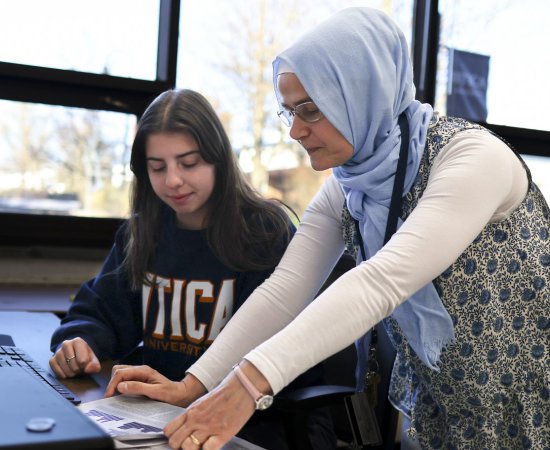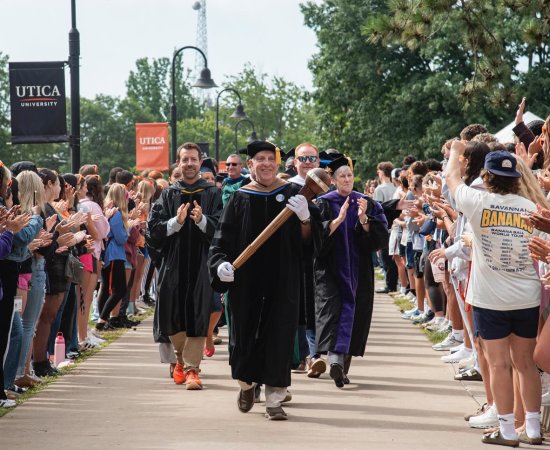
Top Model: Provost Todd Pfannestiel on Utica's reimagined General Education program

"To do something this fundamentally different, and I think better, is almost unheard of in higher education. It’s amazing."
In October, Utica announced the development of a new General Education model to take effect at UC for the freshman class entering in Fall 2022.
According to President Laura Casamento and the Faculty Senate, this new General Education model, known to most as UC’s “Core,” presents greater flexibility to students through reduced credit requirements, introduces thematic minors, and infuses diversity, equity and inclusion into the curriculum.
We talked with Provost Todd Pfannestiel on what this “creative and purposeful” new model means for Utica students on campus—and in the job market.
Utica Magazine: First, can you describe what is meant by “General Education model”?
Todd Pfannestiel: A General Education or “Core” Curriculum, which you’ll find at every college and university in America, is an effort to prepare students with the knowledge, skills, and mindsets to be prepared for any number of job opportunities. When you go through a good General Education program, you will know how to speak well, think well, critically analyze, along with gaining the language skills, mathematical skills, and the general body of knowledge that allows you, in your walk of life, to speak to somebody else from a different walk of life.
UM: By most accounts, the availability of majors is the top factor in a student’s college selection. Why is it important that students also consider the strength, value, and creativity of the General Education program?
TP: Many General Education models can be, frankly, boring and stale. They simply are a laundry list of courses, where you’re told to “pick two here, pick one here,” to fulfill the requirements for your degree. What you want to find is a General Education model that is creative and purposeful, and that’s what we’ve done at Utica. We are going to create several interdisciplinary minors from which students can choose and, as a result, get the outcomes from General Education in an exciting, focused way. I know students will appreciate having more choice and a better understanding of why and how these courses are so essential. We fail as an institution if we can’t say, “In addition to preparing you for your major, we’re going to be sure that you can write well, speak well, think well, and be proficient in quantitative reasoning, so you can be competitive in the job market today and ten years from now.”
UM: Framing General Education through the creation of these thematic minors is really going to provide students an opportunity to choose their own pathway. I have to imagine this will be a very appealing aspect of this new model.
TP: That’s right. Those pathways could be complementary to the major, or could be something that allows them to explore and express themselves in a way that their major alone would not. I can easily imagine a nursing major or an accounting major who, through their General Education program, finds a pathway in American popular culture, where you might have foundational courses in English, History, Sociology, Anthropology, and even Political Science, and you would blend together topical courses involving film, television, comic books, other pop culture artifacts—everything that has nothing to do directly with nursing or accounting, but you’re learning about how society thinks and changes and how their art reflects what they believe in.
UM: A lot of that flexibility comes from the new reduced credit requirements—from 52-55 credits to 37. How was Utica able to do that?
TP: There was some duplication and replication in the current Core model, so we asked, “What about a skill or learning objective that can be developed across three courses in separate disciplines rather than having three dedicated courses?” By reducing the number of credits by 18, we just gave you a semester back. That opens the door to a whole host of opportunities. Do you want to explore a second minor, an intensive internship experience, or to study abroad and know, with confidence, that you can complete your entire program in four years? Here’s a semester back, and you tell us what you’d like to do with it. Again, it’s about choice.
UM: To what extent is Utica a leader in thinking about General Education differently?
TP: The General Education curriculum at about 98 percent of schools today is the same General Education curriculum I took 30 years ago. To do something this fundamentally different, and I think better, is almost unheard of in higher education. It’s amazing. I can’t name one private school our size that’s done this in the past ten years. We’re part of that 2 percent.
More Stories


High spirits, community kick-off 2025 Utica University Convocation

Rainy skies met with showers of smiles at Utica University Move-In Day
I would like to see logins and resources for:
For a general list of frequently used logins, you can also visit our logins page.
